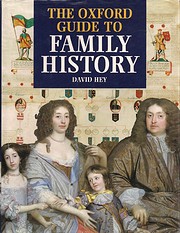

Pulse en una miniatura para ir a Google Books.
|
Cargando... The Oxford Guide to Family Historypor David Hey
 Ninguno Actualmente no hay Conversaciones sobre este libro.  sin reseñas | añadir una reseña
Who were your ancestors? Where did they live? How did they earn their living? At what age did they marry, and how large were their families? Throughout the ages and across the world people have had a natural curiosity about their ancestors, but only recently have amateur historians begun to trace their forebears with such fervor and delight. Written by a leading authority in the field, The Oxford Guide to Family History is a practical introduction to finding out about your family. Much more than a guide to the mechanics of constructing a family tree, this helpful book suggests ways of broadening your own family research to look at what life was like for people of centuries past. Drawing on the oral tradition, financial records, gravestones, or census records, one may, for instance, learn how a family earned their living, what a person was like, or what religion they were. While many of the examples are based on British family histories, David Hey offers much practical advice on the basics of family research. He suggests, for example, that a family historian not start with some famous person who had the same surname back in the fifteenth century. The golden rule is to work backwards from the known to the unknown. Among basic sources for the beginner are municipal records, census records, and church registers. And Hey also points out that many surnames are intensely local in their distribution, and that as a result, tracing the geographical pattern of a surname is an important task, as it may lead towards the original home of the name. Offering practical advice such as how to get started, where to find records, and how to decipher early styles of handwriting, The Oxford Guide to Family History is essential to learning the most about your family history. Lavishly illustrated with pictures of family groups, houses, monuments, and archive records, here is an authoritative guide to this fascinating hobby. No se han encontrado descripciones de biblioteca. |
Debates activosNingunoCubiertas populares
 Google Books — Cargando... Google Books — Cargando...GénerosSistema Decimal Melvil (DDC)929.1History and Geography Biography, genealogy, insignia Genealogy; Heraldry GenealogiesClasificación de la Biblioteca del CongresoValoraciónPromedio: (3.5) (3.5)
¿Eres tú?Conviértete en un Autor de LibraryThing. |
||||||||||||||||||||||||||||||||||||||||||||||||||||||||||||||||||||||||||||||||||||||||||||||||||||||||||||||||||||||||